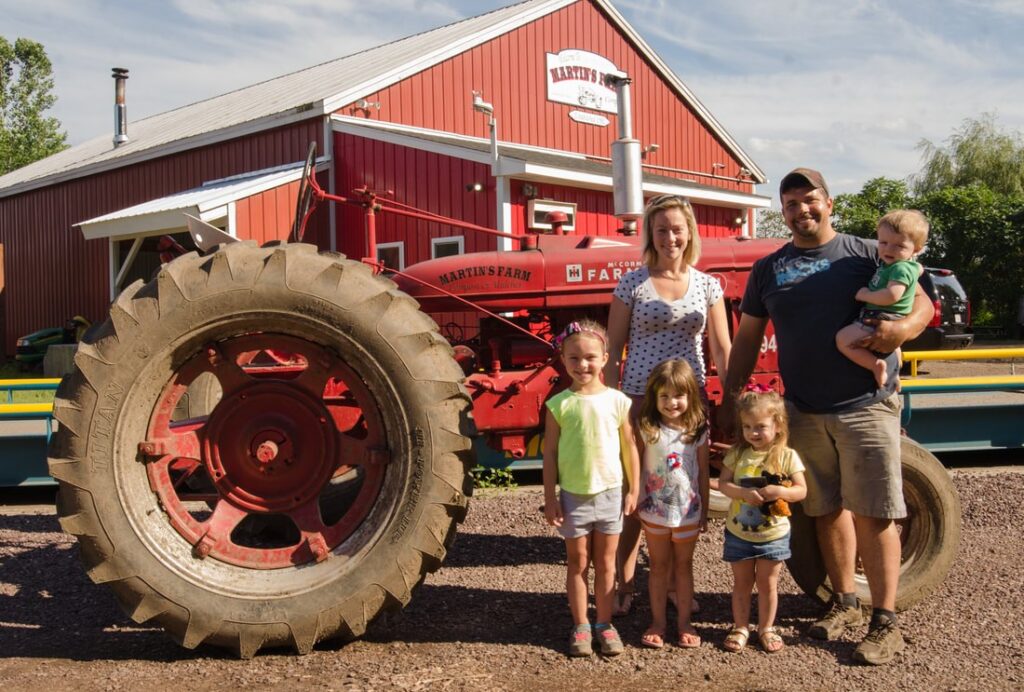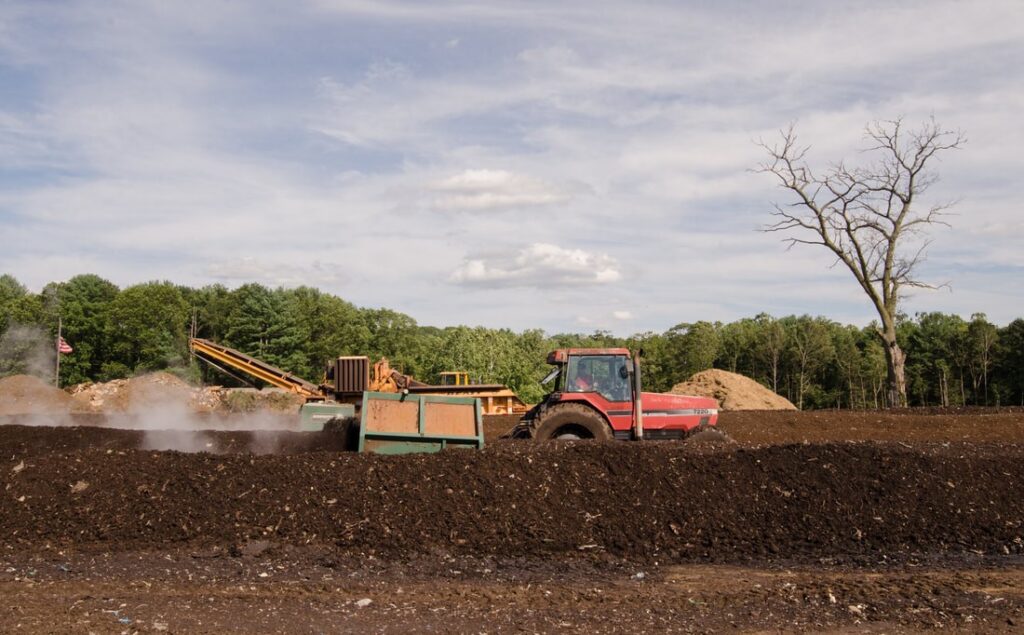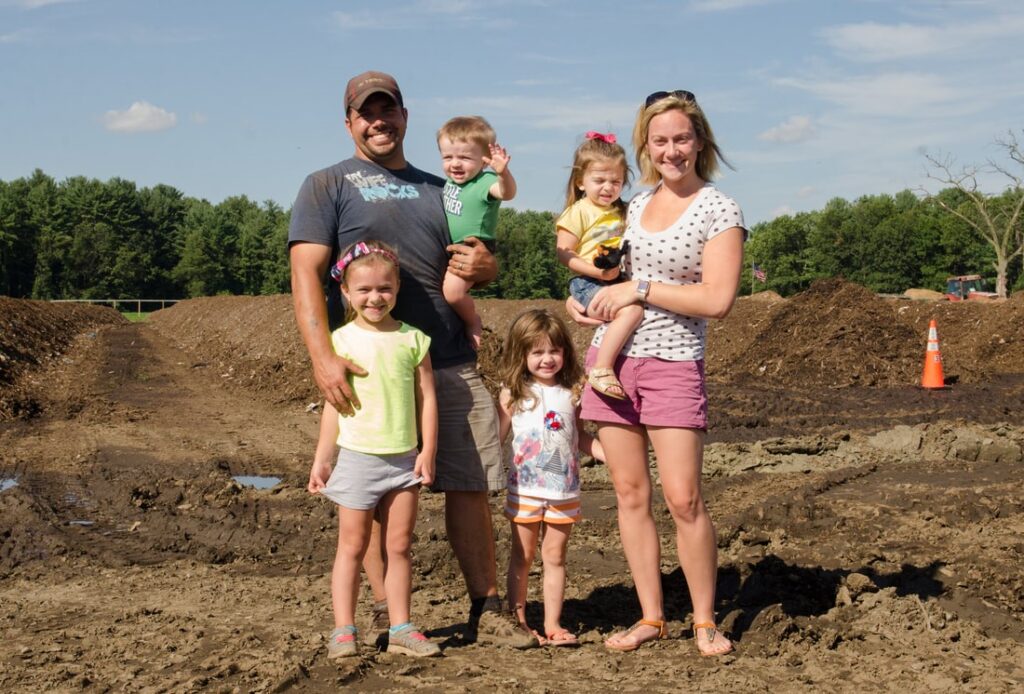
Adam Martin and his family standing with a red “Martin’s Farm” tractor at their compost farm in Greenfield, MA.
Martin’s Farm has been a leader in the composting industry since they were established in 1987. The farm grew vegetables and had a food waste collection program to feed their farm animals. Martin’s Farm decided to start processing compost because they became overwhelmed by the vast amount of food waste that was being produced in their local community. Today, Martin’s Farm converts all of the food waste UMass Amherst collects into rich, dark compost that is then sold to local farmers and gardeners in the Connecticut River Valley. Adam Martin and his family own Martin’s Farm, which was passed down from his father. Martin’s Farm diverted 8,000 tons of waste last year.
To make their final product, Martin’s Farm first mixes together all of the ingredients they need for nutrient rich compost: food waste, cardboard, hay, and manure. They grind it all up through a piece of equipment Adam calls “The Beast.” The mixture is laid into long rows to aerobically break down and is turned every couple of weeks by another piece of equipment to aerate and water the soil. In 3-4 months the compost is ready and is then dried, screened, and sorted again for any contaminants.
Until recently, Martin’s Farm sold certified organic compost to local farmers and gardeners in the Connecticut River Valley. However, because of the contamination of plastics in the food waste they receive from UMass, that organic certification has been revoked. Contamination is a huge problem for Adam’s operation, and when materials are not composted correctly by the UMass community, it has a big impact on the integrity of his business and his compost.

A tractor pulling a piece of equipment that turns each row of compost to aerate and water the soil.
Last year Martin’s Farm spent $4,000 repairing trucks on their equipment after they had been ruined by metal forks that are incorrectly composted at UMass. Other main contamination problems come from plastic bottles, bags, and containers, and when these contaminants are shredded by “The Beast,” they are broken down into pieces that are so small that they slip through all of Adam’s methods of screening. “When you look at the rows of compost on the farm you can see the plastics peppered throughout the piles,” Adam explained. Adam and his team spend about 10 hours a week sorting the loads they receive of compost from UMass by hand, but it is impossible to open every bag and remove every contaminant. “No one understands the extent I am going through to get as clean of a product as possible,” Adam explained. “I’m just trying to make a difference. I am a million and a half dollars in debt. I don’t just care about waste diversion; I care about the final product. I want to make the best compost around.”
The UMass community has the power to improve this situation by composting and recycling correctly and educating and encouraging others to do the same. Not only would it make a huge difference for Martin’s Farm, it would improve the environmental benefit of composting if the final product was free of contaminants. When we asked what students can do, Adam said, “If you want to make a difference, sort your compost.” It’s really quite simple! Below is a list of composting guidelines:

The Martin Family in front of rows of compost in the process of breaking down at Martin’s Farm.
- Be careful not to let metal forks, knives, and spoons slip into the compost bin when you are cleaning off your plate. They ruin tractor tires and jam the equipment at Martin’s Farm.
- Plastic gloves and pink sanitation towels are not compostable.
- Metal cans, tinfoil, plastic water bottles, yogurt cups, and other recyclable matierals are not compostable.
- If there is not a compost bin available, do not throw compostable to-go containers in the recycling bin. Throw them in the landfill bin. In the same way that recyclables contaminate the compost, compostables contaminate the recycling.
- Cardboard is compostable unless it is glossy or coated in other materials.
- Carry reusable silverware, containers, and cups with you to avoid using compostable containers all together! Bioplastics can only be partially broken down through Martin’s Farm composting process and the remaining bioplastic bits are sent to a landfill. Additionally, have offer no nutritional benefits to the soil once broken down.
- Coordinate for your class, co-workers, or organization to visit and tour Martin’s Farm to learn more about their operation and the importance of their work.
- Do your research so you know you are composting and recycling your waste correctly and share your knowledge with the people around you.
Adam points out that we only have 7 years before all of the landfills in Massachusetts will be at full capacity. However, 20-40% of the food that reaches consumers is thrown away. When it comes to compost, Adam remarks that it is really the folks at UMass that are “on the front lines for making a difference.”
Thank you so much, Adam, for working with UMass Dining and for taking the time to speak with us. We are so impressed and inspired by your passion and hard work to make our community more sustainable. To learn more about Martin’s Farm, please visit their website.
